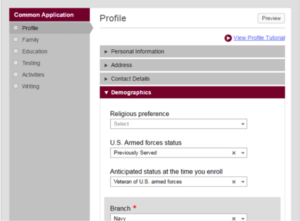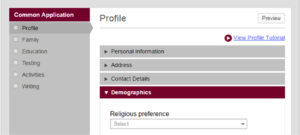Should I Fill Out Demographics On Common App
With the opening of the Common Application on August 1 st , the college admissions season has officially begun. For many students, this period will be characterized by a great deal of time spent with the Common App.
The Common App is utilized by many universities across the nation, and serves as a centralized application database that can help streamline the application process. (Check out our blog post How to Write the Common Application Essays 2017-2018 for the latest essay tips and tricks.)
Going in, many students already know that the Common App will ask them to list the standard components of a college application: grades, test scores, extracurricular activities, and personal statements. However, the Common App actually has several other sections designed to collect more directed information about the applicant.
Among these various components is the "Demographics" page, which we'll be focusing on in this blog post. You can find the demographics page under the "Profile" section of the Common App.
Demographics Section

This section asks questions about an applicant's religious preference, veteran status, and race/ethnicity. These may be questions you haven't thought about answering on your college application. As such, you may not be sure what the purpose of these questions are, how they impact your application, or how you should answer. We'll be answering these questions and more in this guide to the demographics page of the Common Application.
Why does the Common Application ask for my religion, veteran status, and race/ethnicity?
When you first look at the demographics section, your initial question may be why colleges want this information. Essentially, your answers will be used for demographic purposes. Colleges want to have a record of how many members from each given demographic fill out their specific application.
Chances are you've seen a college's admissions statistics page online at some point. Many schools highlight some demographic information on their applicant pool on their websites, and most of that information is based on what students provide on the Common App (or school specific applications with similar questions). This is useful both for potential applicants and for the colleges themselves.
Additionally, having demographic information on record allows colleges to see which groups are well-represented in their pool and which groups aren't. This can be especially beneficial when colleges are deciding how they should direct their outreach efforts to potential applicants. For instance, if one group is particularly underrepresented in a given admissions cycle, colleges may make a stronger effort to reach out to potential applicants from that group in the next cycle.
This information, specifically with regards to race and ethnicity, can also be used for affirmative action purposes. Some universities take into account race and ethnicity when evaluating applicants, and this may be one consideration in the holistic admissions process employed by many schools.
Underrepresented minorities (URMs), such as African American, Hispanic/Latino, and Native American students, may be given an extra advantage in admissions. Additionally, white and Asian American students may be held to higher admissions standards. Each school has a slightly different approach to affirmative action, and there's no way to determine just how much of a role race and ethnicity play across the board. However, affirmative action is one reason why colleges want your demographic information.
Keep in mind that you are not obligated to answer any question in this section. All questions are entirely optional, and whether or not you choose to respond is up to you. You should ultimately do whatever you feel comfortable with.
Will listing my religion hurt my chances of admission?

The first question in the demographics section asks for students to select their religious preference from a drop-down menu. Many different faiths are listed, and students also have the option to select "none" if they feel that best reflects their personal religious preferences.
But will listing your religious preference potentially hurt your application? Most likely not. In fact, by law, public colleges and colleges that receive public funding in any form are not permitted to discriminate for any reason. No matter what religion you choose to list on your Common App, you can rest assured that it will not impact your application to these schools in any way.
The answer is a little different for private colleges. These universities are not bound to the same rules, and thus there is no such law that applies to them in this way. However, generally, there will be no reason for a college to discriminate on the basis of religion.
Indeed, even parochial or faith-based schools often accept applicants from outside the faith. In fact, if you look up the demographic information for most universities, both private and public, you'll find that many different religions are represented on their campuses. In short, listing your religion is unlikely to hurt your chances of admission in any way.
Should I Fill Out Demographics On Common App
Source: https://blog.collegevine.com/a-guide-to-the-demographics-page-of-the-common-application/
Posted by: quallssammat.blogspot.com

0 Response to "Should I Fill Out Demographics On Common App"
Post a Comment